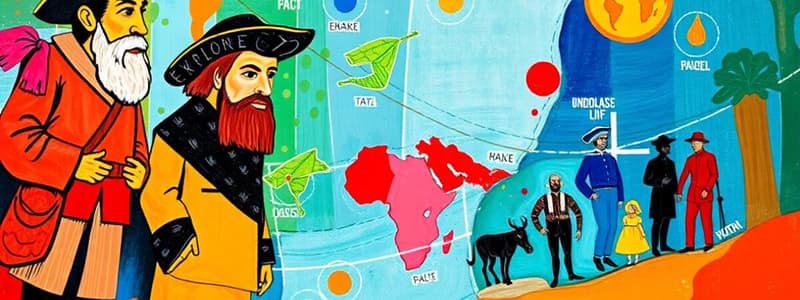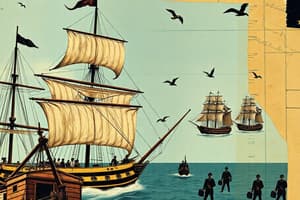Podcast
Questions and Answers
Which instrument was used to measure the angle of celestial bodies during navigation?
Which instrument was used to measure the angle of celestial bodies during navigation?
- Compass
- Astrolabe
- Quadrant
- Cross-staff (correct)
What was a primary motivation for Europeans to seek a sea route to Asia?
What was a primary motivation for Europeans to seek a sea route to Asia?
- To spread the concepts of Humanism.
- To discover new and more advanced trade routes to the west
- To gain direct access to valuable spices and silk. (correct)
- To avoid conflicts with the Mongol Empire.
The Treaty of Tordesillas was an agreement between which two nations?
The Treaty of Tordesillas was an agreement between which two nations?
- The Netherlands and Sweden
- France and England
- Italy and Germany
- Spain and Portugal (correct)
How did the fall of the Mongol Empire impact European exploration?
How did the fall of the Mongol Empire impact European exploration?
What was a significant factor that led to a population decrease in the New World after European arrival?
What was a significant factor that led to a population decrease in the New World after European arrival?
Which of the following is considered a negative result of European expansion?
Which of the following is considered a negative result of European expansion?
What role did Humanism play in the Age of Exploration?
What role did Humanism play in the Age of Exploration?
Besides gold and silver, which other resources were exported from South America?
Besides gold and silver, which other resources were exported from South America?
Which of the following best represents the meaning of 'circumnavigate'?
Which of the following best represents the meaning of 'circumnavigate'?
What is the significance of a 'primary source'?
What is the significance of a 'primary source'?
Which explorer is best known for leading the first expedition to circumnavigate the globe?
Which explorer is best known for leading the first expedition to circumnavigate the globe?
What is the 'quipu'?
What is the 'quipu'?
Which term describes the practice of a country expanding its territory?
Which term describes the practice of a country expanding its territory?
Which invention enabled Portuguese and Spanish explorers to sail faster and more nimbly?
Which invention enabled Portuguese and Spanish explorers to sail faster and more nimbly?
What does 'decolonization' primarily refer to?
What does 'decolonization' primarily refer to?
Who advocated for the rights of Indigenous people in the Americas?
Who advocated for the rights of Indigenous people in the Americas?
Flashcards
Exploration
Exploration
Traveling to new areas to discover and learn about them.
Navigational
Navigational
Related to planning and following a route or course.
Circumnavigate
Circumnavigate
To travel completely around something, especially the Earth.
Expansionism
Expansionism
Signup and view all the flashcards
Imperialism
Imperialism
Signup and view all the flashcards
Quipu
Quipu
Signup and view all the flashcards
Primary Source
Primary Source
Signup and view all the flashcards
Caravel
Caravel
Signup and view all the flashcards
Astrolabe
Astrolabe
Signup and view all the flashcards
Compass
Compass
Signup and view all the flashcards
Cross-Staff
Cross-Staff
Signup and view all the flashcards
What motivated European exploration?
What motivated European exploration?
Signup and view all the flashcards
Treaty of Tordesillas
Treaty of Tordesillas
Signup and view all the flashcards
Columbus Day: Different Views
Columbus Day: Different Views
Signup and view all the flashcards
Indigenous Perspective on Exploration
Indigenous Perspective on Exploration
Signup and view all the flashcards
Resources Exchanged During Exploration
Resources Exchanged During Exploration
Signup and view all the flashcards
Study Notes
Key Terms
- Exploration: Traveling to new areas to discover and learn about them.
- Navigational: Related to planning and following a route.
- Circumnavigate: To travel completely around something, especially Earth.
- Expansionism: Expanding a country's territory.
- Imperialism: Extending a nation's power through diplomacy and/or military force.
- Immunity: Resistance to disease.
- Decolonization: Colonies gaining independence from colonial powers.
- Quipu: A system of knotted strings used to record information by the Incas.
- Point of View (POV): The perspective from which something is seen.
- Primary Source: Original materials from the time period being studied (documents, artifacts).
Notable Explorers
- Christopher Columbus: Discovered the Americas (thought he reached Asia).
- Ferdinand Magellan: Led the first expedition to circumnavigate the globe.
- John Cabot: Discovered parts of North America (Newfoundland).
- Jacques Cartier: Explored the St. Lawrence River, claimed Canada for France.
- Bartholomew Dias: First to round the southern tip of Africa (Cape of Good Hope).
- Vasco da Gama: First to sail directly from Europe to India.
- Samuel de Champlain: Founded Quebec, key figure in French North American exploration.
- Las Casas: Spanish missionary, advocated for Indigenous rights.
- King Ferdinand and Queen Isabella: Sponsored Columbus's voyage.
- Queen Elizabeth I: Supported English exploration & expansion.
Key Inventions
- Caravel: A small, fast, and maneuverable ship used by Portuguese and Spanish explorers.
- Astrolabe: Used by sailors to determine latitude based on the stars.
- Compass: Navigational instrument for determining direction.
- Cross-Staff: Used for measuring the angle of celestial bodies for navigation.
Driving Forces of Exploration
- 4 C's: Christianity (spread religion), Commerce (expand trade), Curiosity (discover new lands), Competition (rivalries between European powers).
- Sea Route to Asia: Europeans sought sea routes to Asia for direct access to spices, silk, and other valuable goods.
- Disrupted Trade Routes: The fall of the Mongol Empire and Constantinople disrupted overland trade routes, leading to the search for sea routes.
- Expansion of Religion: Europeans sought to spread Christianity and compete with Islam in Asia and Africa.
- Humanism Connection: Humanism promoted curiosity, individual achievement, and learning, contributing to exploration.
Treaty of Tordesillas
- Agreement between Spain and Portugal dividing the newly discovered lands outside Europe.
Perspectives on Columbus Day
- Mixed views: Some celebrate Columbus for discovery, others criticize him for harm to Indigenous people.
- Indigenous Perspective: Viewed European explorers as invaders who brought disease, violence, and slavery.
Pre-Exploration World Knowledge
- Europeans had limited understanding of the world.
- Most maps were inaccurate with large unknown areas.
Resources & Impacts from South America
- Exported: Gold, silver, tobacco, sugar, crops (potatoes, corn).
- Population Decrease: Caused by European diseases (smallpox) and harsh treatment of Indigenous peoples.
Impacts of European Expansion
- Positive: Increased trade, cultural exchange.
- Negative: Exploitation of Indigenous people, slavery, environmental damage.
Studying That Suits You
Use AI to generate personalized quizzes and flashcards to suit your learning preferences.




